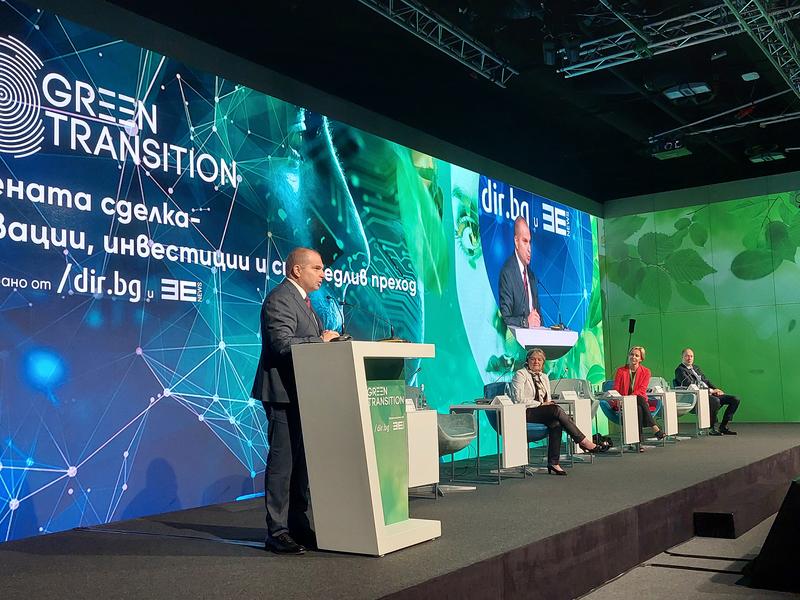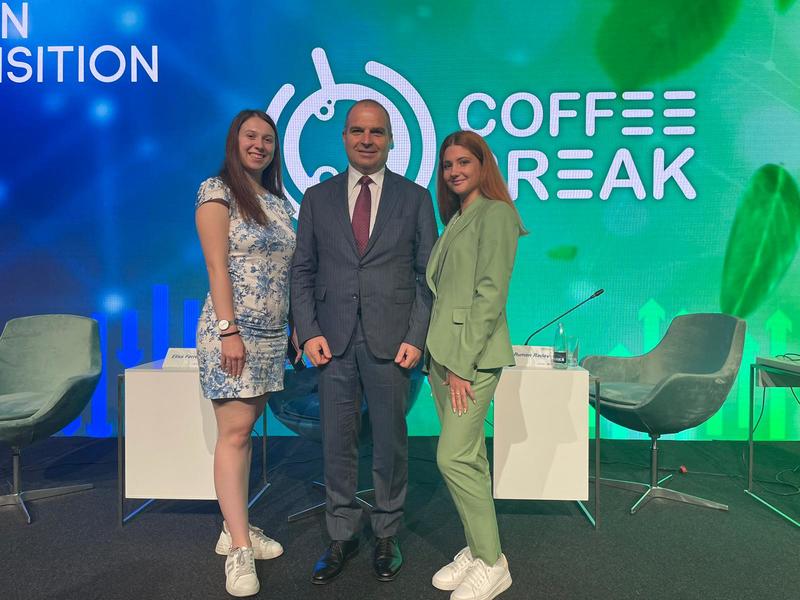Deputy Prime Minister Karadzhov: New jobs will be created as a result of the Green Deal
Deputy Prime Minister Karadzhov: New jobs will be created as a result of the Green Deal
By Ministry of Regional Development and Public Works
The challenge for us now is to reach people with the clear message that the Green Deal is important for them and for the planet we leave to the next generation. And this is in no way at odds with their job opportunities. It will result in new and more jobs. This is what outgoing Deputy Prime Minister and Minister of Regional Development and Public Works Grozdan Karadzhov said at today’s Green Deal - Innovation, Investment and a Just Transition forum.
The forum was attended by the President of Bulgaria Rumen Radev, the European Commissioner for Cohesion and Reform Elisa Ferreira, the President of the European Investment Bank Werner Hoyer and the CEO of UBB, member of the KBC Group Country Team in Bulgaria and leader of the KBC Group Sustainable Finance Programme in Bulgaria Teodor Marinov.
The Deputy Prime Minister pointed out that Bulgaria has the most carbon and resource-intensive economy in the whole European Union. This means high energy inefficiency of production processes. The same applies to the energy efficiency of the building stock. It is against this background that the forthcoming tough reforms in the context of the Green Deal must be carried out.
A key priority for us is to provide full support to Bulgarian regions and municipalities to deal with the socio-economic consequences and the transition to climate neutrality, Karadzhov said. The measures and investments we will support on the road to decarbonisation of the Bulgarian economy must ensure security for people, especially those living in the 3 coal regions - Stara Zagora, Pernik and Kyustendil, he added. The deputy prime minister explained that for this purpose a significant amount of resources will be invested. In the period until 2027 it amounts to 6.6 billion BGN (from the EU and the national contribution) under the Programme for the Development of Regions. The funds should achieve several objectives, each of particular importance: reducing imbalances in the development of municipalities, changing negative demographic trends, economic growth and conditions for a better quality of life for the people in these places. The focus of the investments is on the specificities of individual territories, their needs and development potential, the Deputy Prime Minister noted. He pointed out that 45% of this resource, or BGN 3 billion, will support the three regions in the country most affected by the transition to a low-carbon economy - Stara Zagora, Pernik and Kyustendil. However, it is a prerequisite for support that the measures to be funded are identified in the Territorial Plans for a Just Transition, and the projects to be implemented in these areas will be prepared from the bottom up, i.e. on the ground.
BGN 1,048 billion from the Regional Development Programme will be directed to 10 urban municipalities growth centres based on their integrated development plans. Another 40 medium-sized and smaller municipalities will have another BGN 2.506 billion from the programme. These will support integrated territorial investments with funding from various programmes identified by local stakeholders.
Over BGN 717 million will be invested under the National Recovery and Resilience Plan for sustainable energy renovation of non-residential buildings and green mobility. There is also a programme to fund renewable energy projects in single and multi-family buildings. The funds for energy efficiency of the residential building stock amount to BGN 1.4 billion, Grozdan Karadzhov reminded.
BGN 471 million will be invested in W&S systems and wastewater treatment plants under the Plan. Another BGN 9 million will be directed to the introduction of building information modelling in investment design and construction, and another BGN 3.5 million is planned to finance a unified spatial planning information system that will facilitate the implementation of various projects.
Deputy Prime Minister Karadzhov reminded that thanks to the cohesion policy many strategic infrastructure projects have already been implemented in Bulgaria, which have transformed entire regions. An example is the establishment of the Trakia economic zone around the Trakia motorway. However, this has deepened the divide between southern Bulgaria and northern Bulgaria, where there is still no completed motorway. Therefore, there is still a huge amount of work to be done to provide the necessary transport links. Grozdan Karadzhov said that he had met the Commissioner for Cohesion and Reform, Elisa Ferreira, who understood the need to build a motorway from Sofia, via a tunnel under Petrohan, to Vidin, which would provide a link to Western Europe via a route also in Romania.






